Beethoven: Symphonies 7-9 Blu-ray Movie
HomeBeethoven: Symphonies 7-9 Blu-ray Movie 
Christian Thielemann / Wiener PhilharmonikerC MAJOR | 2008-2010 | 325 min | Not rated | Mar 29, 2011
Movie rating
7.5 | / 10 |
Blu-ray rating
| Users | 3.5 | |
| Reviewer | 4.5 | |
| Overall | 4.4 |
Overview
Beethoven: Symphonies 7-9 (2008-2010)
Starring: Vienna Philharmonic| Music | 100% |
Specifications
Video
Video codec: MPEG-4 AVC
Video resolution: 1080i
Aspect ratio: 1.78:1
Original aspect ratio: 1.78:1
Audio
Music: DTS-HD Master Audio 5.0
Music: LPCM 2.0
Subtitles
English, French, Italian, Japanese, Spanish, Korean, Mandarin (Simplified)
Discs
50GB Blu-ray Disc
Single disc (1 BD)
Playback
Region free
Review
Rating summary
| Movie | 4.5 | |
| Video | 4.0 | |
| Audio | 4.5 | |
| Extras | 4.5 | |
| Overall | 4.5 |
Beethoven: Symphonies 7-9 Blu-ray Movie Review
Joyful, joyful.
Reviewed by Jeffrey Kauffman March 29, 2011One of the (many) glories of the new Beethoven Symphony cycle on Blu-ray from conductor Christain Thielemann and the Vienna Philharmonic is the inclusion of absolutely incredible, in depth musicological analyses of each of the symphonies, presented as bonus documentaries on each disc. With noted (no pun intended) music historian Joachim Kaiser as guide and interviewer, these documentaries are a feast for the ears while also being an incredible source of background information. Kaiser spends a little bit of time in one of the documentaries on this new Blu-ray featuring Beethoven final triumvirate of symphonies lamenting the “artificial” division of Beethoven’s oeuvre into three periods. Similarly, there often seems to be an equally artificial division with regard to the symphonies themselves, with the nonet being sliced and diced into three parts of three each. What is even stranger is that within each of these artificial triptychs, one “panel” tends to be overlooked, no doubt unfairly, in favor of its two more supposedly impressive brethren. Therefore when looking at the first three symphonies, often the Second is ignored at the expense of the rule-breaking First and the literally heroic Third. In our second trio, the Fourth never seems to muster the attention that the iconic Fifth and alternately lilting and stormily pastoral Sixth do. With regard to the final third, for some reason the Eighth gets the short shrift when bookended by, to quote Kaiser again, the “temperamental radiance” of the Seventh and the impossible grandeur and grandiosity of the Ninth. What’s so especially stunning about this new cycle, then, is that each and every Symphony is accorded the same attention to detail, both in terms of the performances themselves, as well as the stellar “peek beneath the covers” that is explored in each of the Symphonies. (It should be noted that we haven’t been able to procure the February release of Beethoven Symphonies Nos. 1, 2, and 3 from distributor Naxos, but hope to soon).
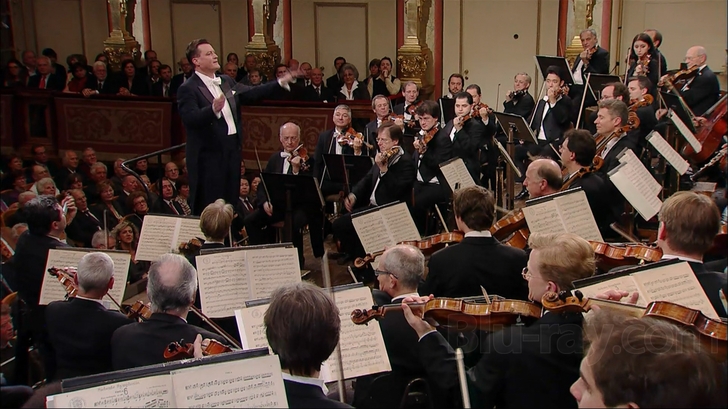
Christian Thielemann is still a relatively young conductor, but he comes to the podium at Vienna after an impressive career which included him “understudying” the iconic Herbert von Karajan as von Karajan’s conducting assistant. Though he may not have truly assumed the typical overnight sensation of an understudy suddenly filling in for the star (a la Bernstein for Walter), Thielemann nonetheless brings a lot of von Karajan’s strengths to his baton while at the same time not bowing to the influence of such a mighty mentor. Thielemann’s Beethoven, while as vigorous as von Karajan’s, is considerably more elastic and Thielemann is not afraid to put his own very personal mark on each of these iconic pieces.
Though Wagner famously described the Seventh as “the apotheosis of the dance,” Thielemann in the accompanying documentary stresses the needed never to subjugate line and lyricism to rhythmic motifs. And that approach is stunningly alive throughout this interpretation; where other conductors simply set up an ostinato and let it play out like a metronome winding down (the metronome will be an issue with the Eighth, as we’ll discuss), Thielemann invests each phrase with a care and often bracing elasticity that makes even such a familiar piece alive and breathing. What’s perhaps even more amazing than Thielemann’s self-described “fractional” pauses and tenuti is his unbelievable command of orchestral dynamics. The Allegretto is a wonder of quick diminuendos and crescendos and, again, it brings the movement to life in a way that is literally akin to breathing.
The Eighth, the supposedly “ugly stepsister” of this legendary trio of Symphonies, was actually probably planned by Beethoven to be his last piece in this idiom (it would be another twelve years before the Ninth would come along). Though the Eighth has never quite risen to the heights of popularity it deserves, it was written at a time when Beethoven’s unquestioned status as a Continental superstar made him unusually confident and even cheerful. That very jocularity bursts through the Eighth with considerable élan, but, again, Thielemann plays against expectations and extracts a perhaps unexpected amount of drama from the piece. In the accompanying documentary, Thielemann talks about his inability to ever really find comic elements in classical orchestral music, as opposed to what he senses in opera and operetta. Humor, yes, Comedy, no. And so he states he wants to avoid playing things as if he’s setting the audience up for a punch-line, despite Kaiser’s assertion that Beethoven is indeed kind of playing with the audience musically throughout the Symphony as a comedian might in a verbal sense. Beethoven's fascination with the metronome is often alluded to especially with regard to the Eighth, but Thielemann recoils from slavish adherence to the M.M. markings, especially since so many of them seem so patently insane (my description), and so this Eighth once again breathes with a freshness that is really bracing and enjoyable.
Again, Thielemann brings an incredible care and nuance to a piece many listeners have heard so many times it almost becomes musical wallpaper. The string playing (and, yes, playfulness) in the third movement is remarkable, but it’s once again the dynamics, this time in the fourth movement, which can literally take the breath away. The Vienna Philharmonic seems to respond to Thielemann like a finely tuned race car, able to “turn on a dime” and go from pianissimo to triple forte in the course of a note.
By the time we get to the incredible Ninth, many viewers of the Blu-ray may have been figuratively beaten into submission by Thielemann’s approach, and will simply be ready to relax and let the wonders begin. Thielemann begins his Ninth with a sort of amorphous take on the strange, mystical opening where the three “perfect” intervals, fifths, fourths and octaves, resound and echo as if percolating within Beethoven’s mind before forming more colorful imperfect intervals. Bruckner has often been described as a composer who utilized a T-square and slide rule in formulating his often architectural structures, and Kaiser and Thielemann agree that Thielemann’s opening of the Ninth is Brucknerian in a perhaps unforeseen way.
From that preternaturally quiet opening, Thielemann builds his forces quickly and impressively, offering among other unusual aspects a surprisingly languid Scherzo. As is so often the case with Thielemann’s interpretations, he’ll hold notes for seeming fractions of a second, but just that slight “tweaking” gives phrases and entire sections new meanings. He also introduces a rather radically long pause before the introduction of the choral section.
The soloists here are Annette Dasch, Mihoko Fujimura, Piotr Beczala and Georg Zeppenfeld. Performing in Vienna’s lush Goldener Saal der Gesellschaft der Musikfreunde, the singers seem at times to struggle slightly to be heard over the orchestral masses and large accompanying chorus, and the men especially have a “wobble” or two making a couple of entrances. Otherwise, though, this is splendidly sung and especially brilliantly played and will surely leap to the head of the pack of currently available Beethoven recordings, Blu-ray or otherwise.
Beethoven: Symphonies 7-9 Blu-ray Movie, Video Quality 
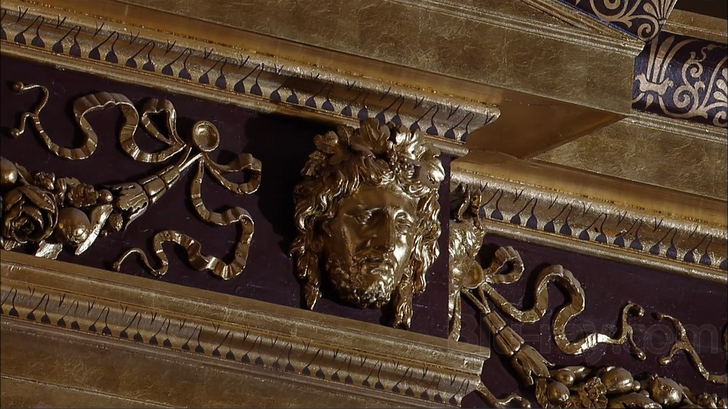
Beethoven Symphonies Nos. 7, 8 & 9 are presented on Blu-ray courtesy of C Major and Unitel Classica, and feature an AVC encoded 1080i transfer in 1.78:1. This is a bright and very sharp looking release that offers the gilt opulence of the Goldener Saal in Vienna in all its glory. Coverage of Thielemann and the orchestra is top notch, and close-ups reveal a wealth of fine detail. Colors are bold and extremely well saturated and contrast and black levels are solid. The transfer suffers from some very slight artifacting, probably due to its interlaced source, and so there is minor, but occasionally distracting, shimmer and aliasing. Otherwise, though, this is a splendid looking Blu-ray release.
Beethoven: Symphonies 7-9 Blu-ray Movie, Audio Quality 
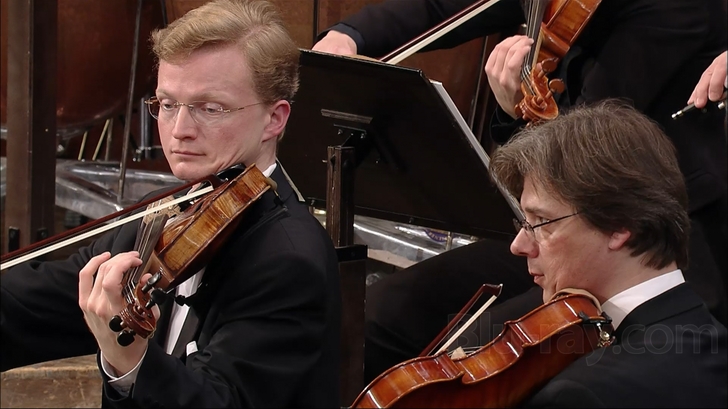
Two brilliantly effective lossless audio tracks are offered on this new Blu-ray, a DTS-HD Master Audio 5.0 mix and an LPCM 2.0 stereo folddown. Stick with the 5.0 in this case, if your home theater is set up to handle it, for you'll be welcomed into a beautifully immersive accounting of all three symphonies. Fidelity is superb throughout all three performances, with gorgeously mixed orchestral sections that are well placed spatially and never overpower each other. Probably most impressive about this recording is its absolutely amazing dynamic range, courtesy of Thielemann's intense attention to detail. As noted above, there are some slight balance issues in the choral finale of the Ninth, where some of the soloists sound inadequately amplified, or at the least are not mixed as far up as they should be. That's a passing and relatively minor qualm, however, in an otherwise practically perfect soundtrack.
Beethoven: Symphonies 7-9 Blu-ray Movie, Special Features and Extras 
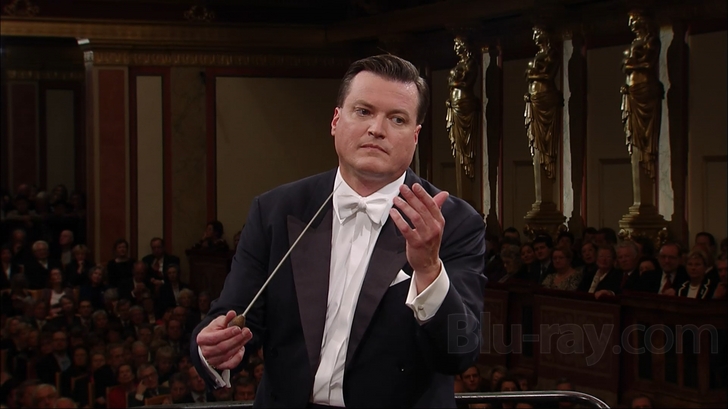
Discovering Beethoven is simply one of the finest sets of documentaries any classical music lover could hope for. Split into three segments, one for each symphony, the set is a nonstop revelation of insight and analysis that amounts to a doctoral dissertation delivered by both Kaiser and Thielemann. Symphony No. 7 (1080i; 58:47), Symphony No. 8 (1080i; 53:03), and Symphony No. 9 (1080i; 57:19) all get amazingly in-depth treatment here, and even better we get comparative snippets of other conductors interpreting these iconic pieces. Those snippets include such legends as von Karajan, Bernstein, Solti and Fürtwangler. This is one of those rare instances where the supplements are as compelling as the main feature.
Beethoven: Symphonies 7-9 Blu-ray Movie, Overall Score and Recommendation 
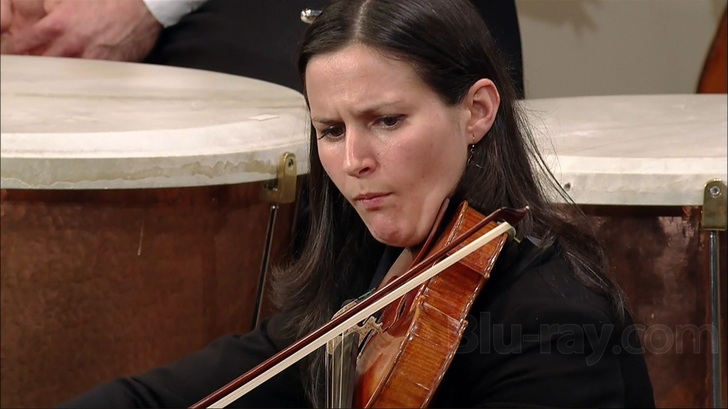
It's a rare and unexpected experience to hear symphonies this familiar as if they're totally new pieces, and yet that is exactly what Thielemann has accomplished with this thrilling release. Kaiser mentions in the documentary on the Seventh how he envies young people who are hearing the Seventh for the first time, but all three of these symphonies are like completely new beasts under the fabulous direction of Thielemann and the impeccable playing and artistry of the Vienna Philharmonic. This is being touted as the first ever Beethoven cycle on Blu-ray, and it's a lucky thing that it's so elegantly successful, as it augurs well for the format as a whole. Just as fine as the interpretations themselves are the absolutely first rate documentaries, which are easily among the finest of their kind anywhere in any classical home video release. Highly recommended.
Other editions
Discovering Beethoven: Symphonies 1-9: Other Editions

Beethoven: Symphonies 4-6
Christian Thielemann / Wiener Philharmoniker
2008-2010

Beethoven: Symphonies 1-3
Christian Thielemann / Wiener Philharmoniker
2008-2010
Similar titles
Similar titles you might also like
(Still not reliable for this title)

Fleetwood Mac: Rumours
Atmos Blu-ray Audio
1977

The Beatles: Let It Be
Super Deluxe Edition | Blu-ray Audio
1970

David Bowie: The Rise and Fall of Ziggy Stardust and the Spiders from Mars
Dolby Atmos Blu-ray Audio
1972

Depeche Mode: Strange Too
1990

Depeche Mode: Strange
1988

Pink Floyd: The Dark Side of the Moon
50th Anniversary Atmos Remix / Blu-ray Audio
1973

Roy Orbison: Black & White Night 30
1987-2017

Prince and the Revolution: Live
1985

John Williams: The Berlin Concert
Limited Deluxe Edition
2021

Pink Floyd: Pulse
1995

Pink Floyd: Animals
Atmos Remix / Blu-ray Audio
1977

Eric Clapton: The Lady in the Balcony - Lockdown Sessions 4K
2021

Madonna: The Girlie Show - Live Down Under
1993

S&M2: Metallica and San Francisco Symphony
2019

John Williams - Live in Vienna
2020

Roger Waters: Us + Them
2019

The Beatles: Abbey Road
Anniversary Super Deluxe Edition | Blu-ray Audio
1969

The Cure: 40 Live - Curætion -25 + Anniversary
2018

Soundgarden: Live from the Artists Den
2013

Eagles - Hell Freezes Over
1994
